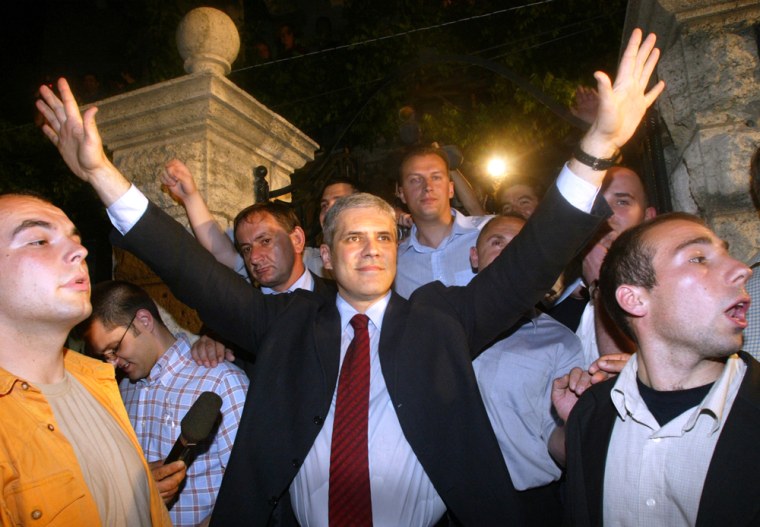A pro-Western reformer won Serbia's presidential run-off election Sunday, defeating a hard-line nationalist ally of former autocrat Slobodan Milosevic.
Boris Tadic received 54 percent of the vote to become Serbia's first democratically elected president since World War II. Nationalist Tomislav Nikolic got 45 percent, the state electoral commission said. Turnout was 48 percent.
The vote was seen crucial to whether Serbia moves closer to the European Union and NATO, or sinks back into the nationalist isolation reminiscent the Milosevic regime.
"This election has shown that Serbia knows how to recognize a historic moment," Tadic said, celebrating his victory.
"My hope is that Serbia will never again be led by a man who will spearhead the killing of our countrymen," he added, referring to Milosevic, whose nationalistic regime triggered the Balkan wars of the 1990s that broke apart Yugoslavia.
Nikolic, conceding defeat based on his Serbian Radical Party's tally, blamed his loss on "almost all Serbian politicians and the West for spreading fear" among voters.
Three previous attempts to elect a Serbian president since 2002 failed because too few voters showed up. Earlier this year, parliament scrapped a 50 percent turnout requirement.
Milosevic, now standing trial for U.N. war crimes charges including genocide in The Hague, Netherlands, was elected in votes election monitors considered rigged. Earlier votes after World War II were held during communism.
Tadic had been the favorite from the first round of voting, when Prime Minister Vojislav Kostunica, most ethnic minorities and many local celebrities supported him over 12 other candidates.
Tadic has been an ardent supporter of extraditing Serb war crimes suspects to the U.N. tribunal covering the Balkan wars, Europe's worst carnage since World War II.
Nikolic, 52, strongly opposes Western extradition demands and had said he would dedicate a victory in Sunday's election to Milosevic.
Tadic, 46, a soft-spoken Sarajevo-born psychologist and Belgrade college professor, entered politics in 1990 as a member of the pro-Western Democratic Party.
He took his party's helm in February after the assassination of Zoran Djindjic _ the Democrats' leader and Serbia's first noncommunist prime minister since World War II _ in March 2003.
In the years after Milosevic's ouster by a pro-democracy movement in 2000, Tadic was Yugoslavia's communications minister in 2001 and then defense minister in the Serbia-Montenegro union that replaced Yugoslavia. He resigned earlier this year after the Democrats lost power to conservatives in general elections in Serbia, the country's dominant republic.
A Nikolic win could have pushed Serbia into renewed isolation and prompted the United States, the European Union and major international organizations to scale back _ or simply cut off _ financial and political support for the cash-strapped republic.
Nikolic ran a cemetery in the 1980s in his native town of Kragujevac, earning himself the nickname "Toma the Gravedigger."
It was in Kragujevac, in central Serbia, that he merged his own small-town party with the Serbian Radical Party of Vojislav Seselj. After Seselj surrendered to The Hague tribunal in 2003 to face war crimes charges, Nikolic took over.
While not in the government, the Radicals emerged as the strongest party in Serbia's last general elections, reflecting a resurgence of nationalist sentiments among Serbs disillusioned by slow reforms and a stagnant economy.
Nikolic had finished first in the initial round of voting June 13, receiving 30.4 percent of votes while Tadic received 27.6 percent.
